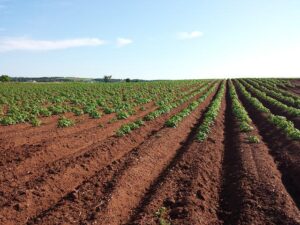It goes without saying that the world is undoubtedly in the most unstable position it has been in both economically and politically in nearly a century. Along with the threat of a third world conflict comes a looming global food crisis. For far too long, Canada and other Western nations have been heavily dependent on imports. Is it time to de-globalize our food supply and focus more on regional and local markets?
My grandfather died when I was nine years old. When asked what life was like for him growing up on a small farm in rural Prince Edward Island during the Great Depression, my grandfather, Peter McGarry, replied that he and most other people in his position didn’t see a great deal of difference, except for the fact that some commodities such as sugar, salt, and tea were a bit more expensive and in shorter supply and were therefore purchased in bulk.
Back in those simpler times, people by and large were far more self sufficient than we are today. Agriculture was centred more around local economies, and although crops were still exported to the larger cities, much of what was produced was sold and consumed locally. Also, people tended to eat in-season.
Sure, life back then perhaps wasn’t quite as convenient or consumer oriented as our world is today, and while our ancestors may not have had all the choices we have now, when hard times struck, they were at least able to weather the storm.
Now, after nearly 80 years of relative global peace and stability, the world finds itself facing another crisis.
You most likely have noticed that the last two years have been a frenetic whirlwind of unprecedented events, including a pandemic and record inflation that greatly contributed to the reduction of incomes as well as disrupting global supply chains.
while poor and developing countries have been hit the hardest by this period of instability, industrialized nations have not been left unscathed either, as a visit to any grocery store shows that the prices of food have also increased dramatically, not to mention the availability of many products.
For decades, we have relied heavily on imports – particularly food. with this global crisis only anticipated to get worse, isn’t it time we look at turning back the tide of large-scale corporate agriculture and return – at least somewhat – to smaller, local farms?
I have spoken with people from Ontario and many areas of the United States who for years spent their summer vacations in Prince Edward Island. Decades ago, in addition to Anne of Green Gables, the Island’s gorgeous beaches, and the simplistic nature and beauty of Canada’s smallest province, one of the big tourist draws was driving around the pastoral landscape viewing all the small farms that sadly no longer exist.
In the 1970s and 1980s, there was a move away from small local farms in PEI towards a model of corporate agriculture whereby over time greater amounts of farmland would be in the hands of fewer and fewer enterprises.
I’m not so idealistic as to believe that we will simply overnight return to a way of life that was common a couple of generations ago and will (barring an apocalyptic event) stay in the past. But, at the same time, I believe it is worth looking into how to make smaller farming operations more profitable.
During the pandemic, with people having more time on their hands and concerned about global events, many started gardening. As of late, there has been an increased interest – particularly among younger couples with families – to get into hobby farming or even homesteading.
Unfortunately, in recent years, with so much demand for Island farmland from corporate agricultural interests, developers, and foreign and domestic investors, the prices have gone up considerably.
Many factors – including the price of farmland – will need to change to make a transition to more localized agricultural economies. With a looming global food crisis, it is better for all concerned to be able to get as much of their food locally instead of being heavily reliant on imports, which guaranteed will be interrupted due to supply chain issues.
0 Comments